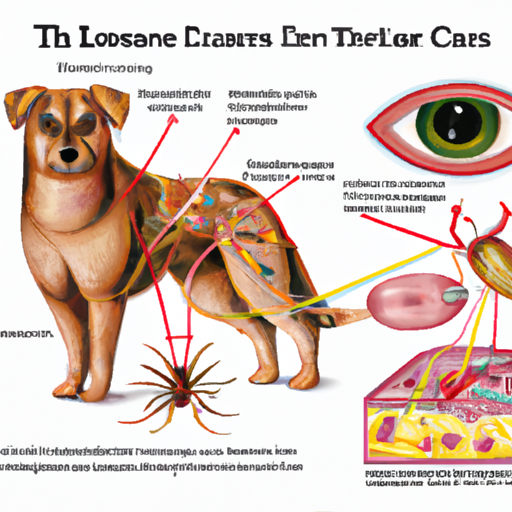Introduction
You might have heard about parasites in dogs, but what exactly are they? The term parasites, in this context, refers to organisms that live on or in a host organism and get their food from or at the expense of their host. In dogs, these parasites can cause a range of health problems, some more serious than others. Let’s delve deeper and understand these parasites better.
Common Types of Parasites in Dogs
There are many types of parasites that can affect your furry friend. Here are some of the most common:
- Fleas: These are small, jumping insects that feed on your dog’s blood. They can cause itching and discomfort, and in severe cases, can lead to anemia.
- Ticks: Ticks are arachnids that also feed on your dog’s blood. They can transmit diseases like Lyme disease and Rocky Mountain Spotted Fever.
- Heartworms: These are serious and potentially fatal parasites that are transmitted through mosquito bites. They live in the heart and blood vessels of infected dogs.
- Intestinal worms: These include roundworms, hookworms, tapeworms, and whipworms. They live in your dog’s digestive system and can cause a variety of symptoms.
| Parasite | Symptoms | Transmission |
|---|---|---|
| Fleas | Itching, redness, hair loss | Contact with infested animals or environment |
| Ticks | Redness, swelling, possible diseases | Contact with ticks in environment |
| Heartworms | Cough, fatigue, weight loss | Mosquito bites |
| Intestinal worms | Diarrhea, weight loss, dull coat | Ingestion of eggs from environment |
Prevention and Treatment
Fortunately, there are a variety of products available to prevent and treat these parasites. These include:
- Flea and tick preventatives, which are typically applied to the skin or given orally.
- Heartworm preventatives, which are usually given orally or through an injection.
- Deworming medications, which are used to treat intestinal worms.
It’s important to consult with your vet to determine the best prevention and treatment plan for your dog.
The Impact on Your Dog’s Health
Parasites in dogs are not just a nuisance; they can have serious health implications. Some parasites can cause severe itching, leading to skin damage and secondary infections. Others can cause anemia, weight loss, and other systemic issues. In some cases, parasites can even be fatal. Therefore, it’s crucial to keep your dog protected.
Your Role as a Caregiver
As a caregiver, you play a vital role in protecting your dog from parasites. Regular vet check-ups, proper preventative care, and prompt treatment if your dog does become infected are all critical. Remember, your dog depends on you for their health and well-being.
FAQs
Q: Can I get parasites from my dog?
A: Some parasites, like certain types of ticks and fleas, can also affect humans. It’s important to maintain good hygiene and use preventative measures to protect yourself.
Q: How often should I deworm my dog?
A: The frequency of deworming depends on your dog’s lifestyle and risk factors. Your vet can provide the best advice.
Q: Can indoor dogs get parasites?
A: Yes, even indoor dogs can get parasites, though the risk is lower. Regular preventative care is still important.
Q: What are the signs that my dog has parasites?
A: Signs can vary widely, but common ones include itching, diarrhea, weight loss, and changes in coat condition. If you notice any unusual symptoms, it’s best to consult your vet.



